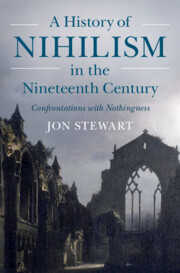‘Jon Stewart's A History of Nihilism in the Nineteenth Century presents a remarkable new interpretation of the development of thinking about the problem of the meaninglessness of the human condition that is referred to as nihilism. This concept is usually associated with twentieth-century existentialism, but Stewart traces how the crisis of meaning arose far earlier, namely as a result of the development of Enlightenment science which undermined traditional religious belief. Insight after insight is gained into the different dimensions of nihilism by means of close readings of key thinkers and writers of the nineteenth century. In experiencing the amazing amplitude of scope of the source-critical work and the creative interpretive turns that come as the narrative unfolds, one senses being in the presence of an author of significant humanity and erudition.'
Curtis L. Thompson - Thiel College
‘A History of Nihilism in the Nineteenth Century delivers a comprehensive, balanced survey of the leading philosophical and literary attempts to grapple with the concept of nothingness. Stewart's erudition is on full display as he sheds new light on well-known theorists of nihilism, e.g., Schopenhauer, Nietzsche, and Turgenev, while elevating the contributions of neglected figures, e.g., Klingemann, Büchner, and Møller. Students and scholars alike will appreciate Stewart's clear, engaging, and jargon-free exposition of one of the defining ideas of the nineteenth century. An impressive achievement by any measure.'
Daniel Conway - Texas A&M University
‘While other histories of nihilism focus primarily on one or another of these problems, Stewart's work is unique in that it comes to terms with nihilism as a complex set of problems and thereby offers a comprehensive approach to the topic. By introducing new readers to the multiplicity of the concept, Stewart offers a fresh account that is at once a conceptual study of nihilism's myriad problems, a genealogy of its modern origins, and a comparative analysis of its figures. Readers come away from the book having been introduced to the issues and proposed solutions of nihilism as well as to the interdisciplinary trajectory of philosophical, religious, and literary engagements.’
Nahum Brown - The Philosophical Quarterley
‘… the book’s clarity and its didascalic slant make this volume an ideal companion for a course on nineteenth-century perspectives on nihilism.’
Davide Marino
Source: Religious Studies Review



